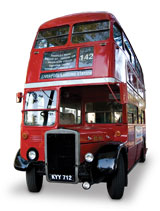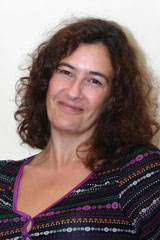In this issue
Home page
-
Features
-
Departments
- Letters
- News & Notes
- Parents
- Alumni
- Class Notes
- Giving
- Sports
- Aggies Remember
- End Notes
Third floor Mrak Hall
University of California, Davis
One Shields Avenue
Davis, CA 95616
(530) 752-1930
Volume 27 · Number 4 · Summer 2010
A Year Abroad at UC Davis
Despite the familiar double-decker buses, a British student discovers a new world of women’s studies, personal journals and burgers ‘to die for.’
by Caitlin Davies
It’s the summer of 1985 and I’ve just arrived at San Francisco Airport. The immigration officer asks me why I’m here. I tell him I’m spending a year at UC Davis. “Where?” he says. Then I tell him I’m studying American literature. “Hey,” he laughs, “I didn’t know we had any literature.”

This makes me worried. When I started at the University of Sussex in England I knew that as part of my American studies degree, I’d have a year in the States. I’d chosen UC Santa Cruz, where I’d heard you could get credits for surfing, but instead I’d been sent to Davis.
This, I was told, was really a vet school. It wasn’t anywhere near the sea. And its claim to fame was for having grown the square tomato.
First impressions were bizarre. I got off the air-conditioned fineness of the Amtrak train — “there you go ma’am,” said the guard, putting out a little blue box for me to stand on — and made my way through the station. Then, just as I turned a corner, I saw a strange apparition, a big red double-decker bus. I wondered if I had managed to leave London at all.
But it soon became clear that I had.
Davis then was startlingly clean and new. The campus was as orderly as an ornamental park; the city looked as if it had been built 10 minutes ago. There were none of the lanes or terraces or crescents or mews of a city like London, only streets. And most of the downtown streets didn’t have names, just numbers or letters. At first this seemed unimaginative, but then I thought there was a strange sort of democracy about it, as if no street were any better or worse than another.
I rented an apartment on Olive Drive and in the evenings sat in the field at the back and listened to Amtrak going by. In the mornings I’d walk past “Murder Burger — so good they’re to die for” and puzzle over the sign. Did it mean the burgers were good enough to kill for, or to kill yourself for? Or was “die” being used in the Shakespearean sense, promising untold sexual pleasure?
There were three of us on the exchange program and everyone loved us just because we were English. All we had to do was open our mouth and say, “Excuse me, is this the way to . . . ?” and in an instant we had a new friend.
But this sudden friendliness unnerved us too. One of my colleagues was deeply offended by supermarket cashiers who insisted on saying, “Have a nice day!” She would mutter ominously, “Why do they keep on saying that? I don’t even know them!”
But it was the university courses that really changed me, because I realized that unlike the British university system, I could pretty much do anything I wanted. And what I wanted was women’s studies, which I hadn’t heard of until then.
I was astounded the first time I heard a lecturer denounce the United States for its racism, sexism and homophobia. To a 21-year-old from London, that was radical. For the first time ever I began studying a subject close to everyday life.
For the first time too, I participated in demonstrations. One evening a group of us picketed the porn film, Debbie Does Dallas, which was being shown on campus. An irate frat boy circled us the entire time on his bicycle, shouting, “None of you are even pretty!”
And literature? There was plenty of that too. One evening Alice Walker came to speak and such were the crowds that loudspeakers had to be set outside the hall so the hundreds gathered on the grass could hear her too. I wished the immigration man could have seen that.
But doing women’s studies also meant having to keep a journal, and we British don’t do personal. I was to write down my innermost thoughts and give them to a stranger to read? Are you kidding? But by the second quarter I was offered a job as a teaching assistant.
The main thing about being abroad, though, was the chance to be someone new. To be in a place where no one knows you can be a heady sort of freedom, and when I went back to England I felt I’d been to another world and returned a different person.
I’ve not been back to Davis for 23 years, except in dreams where I’m walking along the wide-open streets looking for something, perhaps a double-decker bus.

Caitlin Davies, who attended UC Davis in 1985–86, lives in London where she is a journalist and novelist. She returned to the U.S. in 1987 and earned an master’s degree in English from Clark University in Worcester, Mass. She then trained as a teacher and spent 12 years in Botswana, about which she wrote a critically acclaimed memoir, Place of Reeds. Her recent novel, Friends Like Us (Simon & Schuster), includes a female character who reconnects with three girlfriends in London after studying at UC Davis.
